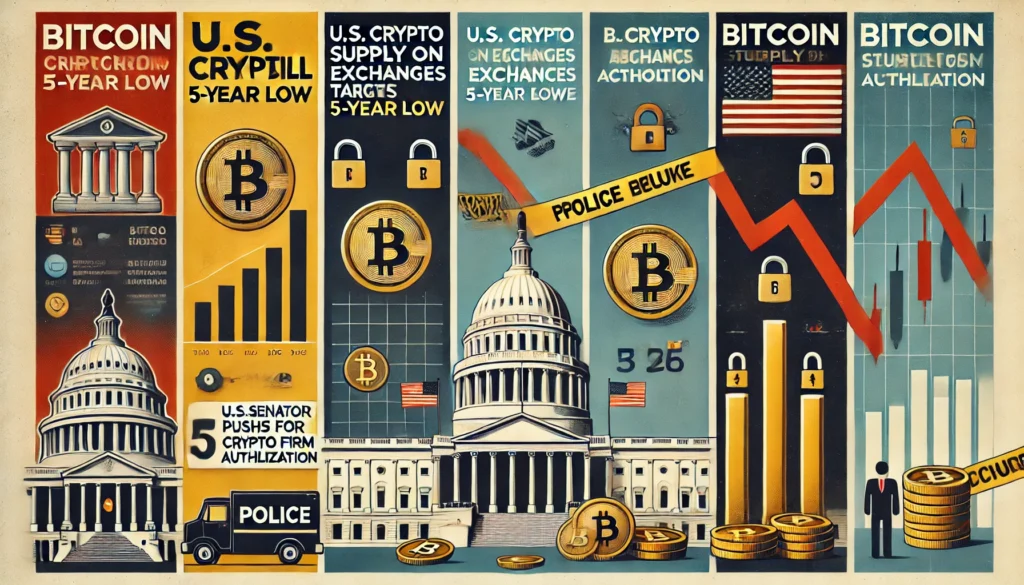4 Important Crypto News: Bitcoin Drops Below $80K, U.S. Inflation Slows, Grayscale Predicts Positive Outlook, Thailand Targets P2P Platforms : BotSlash Daily Crypto News Analysis

In a highly dynamic global financial climate, Bitcoin is once again at the forefront of attention—this time with a sharp price correction linked to intensifying U.S.-China trade tensions. Meanwhile, the U.S. reported a rare dip in consumer prices, surprising markets but raising fresh concerns over the longer-term impact of new tariffs. While volatility dominates the […]
4 Important Crypto News: Ripple’s $1.25B Move, Bitcoin’s Slide, BlackRock’s EU ETF, and Hive’s Paraguay Expansion — BotSlash Daily Crypto News Analysis

The past 24 hours brought impactful developments across key sectors of the crypto world, signaling a deepening institutional presence and reactive market shifts. Ripple is making a power move with a $1.25 billion acquisition aimed at expanding its DeFi influence. Meanwhile, the broader crypto market reacted negatively to macroeconomic fears, pulling Bitcoin to new lows […]
5 Important Crypto News: Bitcoin Eyes New Highs, Tariff Shockwaves, PayPal Expands, Safe-Haven Hype, Altseason Fades – Botslash Daily Crypto News Analysis

Bitcoin continues to attract institutional attention amid favorable U.S. macroeconomic signals and increasing volatility in traditional markets. As the U.S. government signals immediate enforcement of tariffs, financial markets experience turbulence, but Bitcoin emerges with notable stability. This resilience is reinforcing its status as a potential safe-haven asset. Meanwhile, PayPal expands its crypto portfolio with the […]
4 Important Crypto News: Dogecoin Open Interest Plummets, Bitcoin Correction Signals, and Gold-Backed Crypto Dips – Botslash Daily Crypto News Analysis

Shifts in trader behavior, technical correction signals, and broader macroeconomic ripples are defining the latest moves in the crypto landscape. From Dogecoin’s massive open interest drop to cautious moves by Bitcoin short-term holders, the signs point to a more conservative market sentiment in the short term. Meanwhile, even gold-backed cryptocurrencies—typically viewed as safe havens—are experiencing […]
7 Important Crypto News: U.S. Push for Bitcoin Reserve, Bearish Divergence, UK Regulations & Exchange Supply Trends – BotSlash Daily Crypto News Analysis

A pivotal day in the crypto space as U.S. lawmakers accelerate efforts around both combating illicit activity and exploring Bitcoin as a sovereign reserve asset. Technical signals warn of a possible downturn even as investor behavior turns bullish, pulling Bitcoin off exchanges in record volumes. Meanwhile, the UK makes long-term regulatory commitments, signaling growing international […]
7 Important Crypto News: FOMC-Induced Volatility, SEC’s Crypto Roundtable, North Carolina’s Bitcoin Bill & More – BotSlash Daily Crypto News Analysis

Regulatory shifts, institutional trends, and economic policies continue to shape the cryptocurrency landscape. With the Federal Reserve’s FOMC decision expected to drive price swings in Bitcoin, Ether, and Solana, traders are bracing for volatility. Meanwhile, the SEC’s first cryptocurrency roundtable signals a possible shift toward clearer regulations, and North Carolina is exploring Bitcoin as a […]
7 Important Daily Crypto News: Market Resilience, Bitcoin’s Bull Run, Crypto-to-Debit Services, Memecoin Legislation, Futures Correction Risks, Bitcoin Reserve Plans, and Pakistan’s Regulatory Council… Botslash Daily Crypto News Analysis

The latest developments in the crypto world underscore the sector’s resilience amid global financial uncertainties. From regulatory actions to new market features, the crypto ecosystem continues to evolve rapidly. Institutional demand for Bitcoin remains strong, even as governments propose new legislation targeting memecoins and the integration of Bitcoin into state reserves faces hurdles. Meanwhile, innovation […]
5 Important Crypto News : GameStop’s Bitcoin Bet, Polkadot ETF, U.S. Economic Uncertainty & Dubai’s Stablecoin Approval – BotSlash Daily Crypto News Analysis

The financial world is witnessing a dynamic shift as major corporations and governments take decisive steps regarding crypto assets. From GameStop’s potential Bitcoin treasury strategy to Nasdaq’s move toward a Polkadot ETF, institutional interest in crypto continues to grow. Meanwhile, macroeconomic concerns in the U.S. are affecting consumer confidence and stock markets, influencing investment behaviors. […]
Daily Crypto News Analysis – 8 latest News : Bitcoin ETFs See Outflows, Tether Claps Back at JPMorgan, and Regulatory Shifts Unfold

The cryptocurrency market continues to navigate a mix of institutional developments, regulatory shifts, and macroeconomic influences. Today’s headlines highlight key movements, from Tether’s sharp response to JPMorgan’s Bitcoin sell-off speculation to Coinbase’s renewed push for entry into India’s regulated market. Meanwhile, U.S. Bitcoin ETFs have recorded three consecutive days of outflows, raising questions about investor […]
8 Latest Crypto News : TON’s Cross-Chain Upgrade, Binance-SEC Lawsuit Pause, Bitcoin Supply Shock & Global Regulatory Shifts : Botslash Daily Crypto News Analysis

From Hong Kong recognizing Bitcoin and Ethereum as proof of wealth for residency applications to North Carolina exploring BTC as a state reserve asset, governments worldwide are adopting contrasting crypto policies. Meanwhile, Binance and the SEC’s lawsuit pause hints at a potential regulatory resolution, and a significant decline in Bitcoin exchange reserves suggests a possible […]

